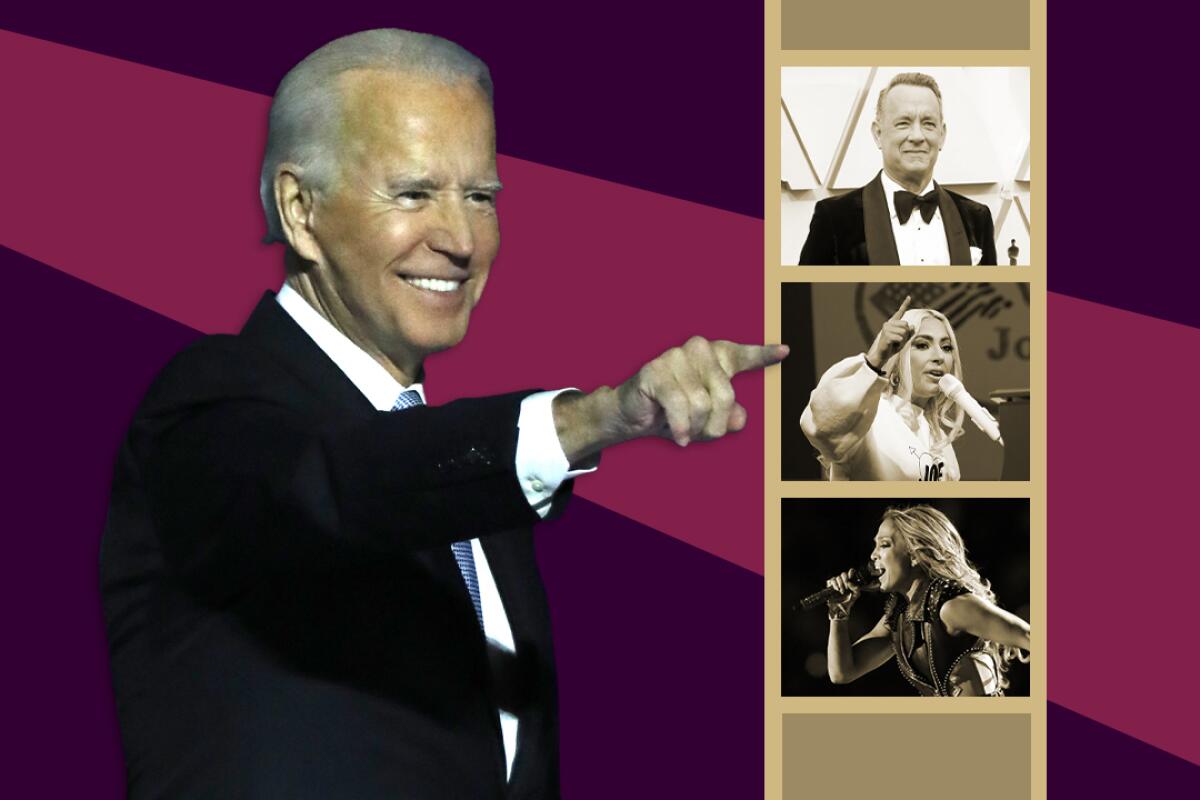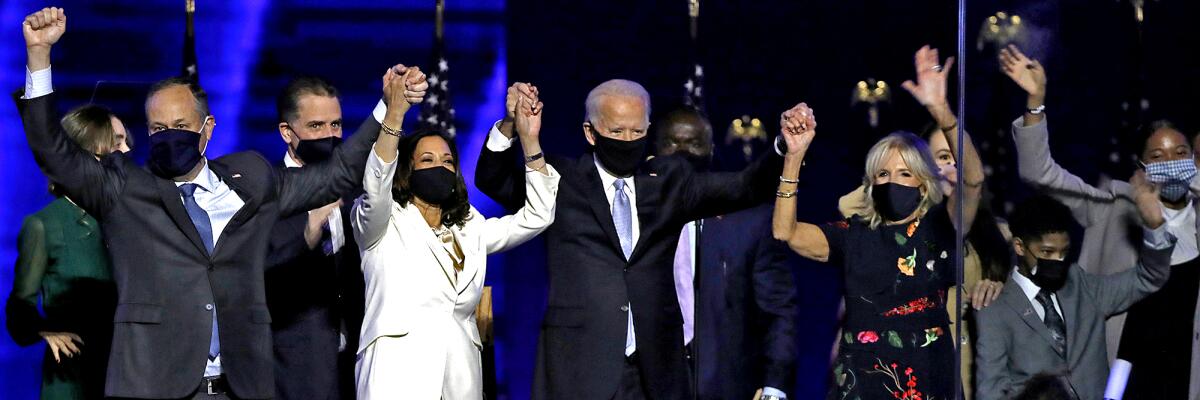The Wide Shot: Will Biden be good for Hollywood?

- Share via
The most anticipated show of the week airs from Washington, D.C., on Wednesday, when Joe Biden becomes the 46th president of the United States.
Though the ceremony will be scaled back due to COVID-19, the star power will be hard to miss on Inauguration Day, with Lady Gaga set to sing the national anthem and Jennifer Lopez and Garth Brooks also on deck to perform. For the virtual “Parade Across America,” the ‘90s band New Radicals will perform for the first time in over two decades (their 1998 song “You Get What You Give” served as incoming Second Gentleman Douglas Emhoff’s campaign walk-on music, and also held special significance for Biden’s son Beau during his battle with cancer).
The networks will later air a prime-time “Celebrating America” special, hosted by Tom Hanks and featuring performances by Jon Bon Jovi, Demi Lovato, Ant Clemons and Justin Timberlake. The “Can’t Stop the Feeling” singer plans to perform his and Clemons’ song “Better Days” to, as he put it on Twitter, “encourage everyone to stay hopeful.”
The red-carpet welcome for Biden and Harris is a preview of what we can expect to be a much friendlier relationship between the White House and the entertainment industry, after celebrities and filmmakers campaigned hard for the Biden-Harris ticket, as well as the two Democratic Senate candidates in Georgia who flipped legislative control.
The Trump administration showed little interest in pushing policies that would benefit an industry that largely shunned him and decried his moves on immigration and his response to racial injustice and the COVID-19 pandemic.
So what can Tinseltown expect to see in terms of policies that affect the business?
After inauguration ...

Biden’s clear early priority is to pass a COVID-19 spending package to boost the economy, which would benefit entertainment industry professionals thrown into uncertainty because of stop-and-go productions, layoffs and theater closures.
The most recent stimulus bill passed in December included items helpful to the industry, including grants for smaller theater companies, a continuation of unemployment benefits, a payroll retention credit and a five-year extension of federal film and TV tax benefits.
Biden on Thursday proposed a $1.9-trillion economic and pandemic plan, including $400 billion to accelerate the pace of vaccinations. It remains to be seen what will get through Congress, but a big stimulus would be welcome in the industry.
Media companies will probably be less thrilled about Democrats’ ideas on corporate taxes.
Studios will also be closely watching how the Biden administration handles digital piracy compared with the Obama administration, which was tight with Silicon Valley and thus wasn’t particularly friendly to the anti-piracy cause.
The new administration will probably be more sympathetic to studios and film and TV producers, depending on who the president picks for key roles in the White House and U.S. Trade Representative’s office.
“The president-elect has been very supportive of intellectual property throughout his career, so we’re hopeful and encouraged about this new administration,” said Patrick Kilcur, head of U.S. government affairs at the Motion Picture Assn., which represents the major studios and Netflix.
Improved international trade relations would also be a positive development for an industry that is increasingly dependent on global revenues.
Trump’s hawkish trade stance with China hurt efforts to export movies to the Middle Kingdom, especially for the indie studios that sell their wares under a flat-fee system. If tensions ease, that would be a relief to film companies for which China remains an important market. The industry has long wanted to further pry open China’s market by expanding the number of imported films allowed under a revenue sharing system and increasing the share of the box office revenues foreign studios collect.
Biden will probably take a less aggressive stance on relationships with China, though it’s unclear what he will do about tariffs currently in place. It was then-Vice President Biden who led last-minute negotiations in 2012 that resulted in a key trade agreement easing restrictions on distributing movies in China.
Industry sources are encouraged by Biden’s pick of Katherine Tai, who is well-versed in issues between the U.S. and China, as trade representative. Tai, currently chief trade counsel for the House Ways and Means Committee, is fluent in Mandarin and is a former USTR chief counsel for China trade enforcement. Disney’s Bob Iger has been floated as a potential ambassador to the country.
On the deal-making front, Democrats are traditionally more keen on antitrust action than Republicans, though it’s hard to make direct comparisons to Trump, whose administration allowed Disney and 21st Century Fox to merge with relative ease but sought, unsuccessfully, to block AT&T’s purchase of CNN owner Time Warner.
Another hot topic is Section 230, which, as my colleague Brian Contreras explained, is the once-obscure law that shields social media companies such as Facebook and Twitter from liability over material users post on the platforms (though the law has a carveout for piracy). Biden has said he supports repealing it, and the recent mob takeover of the Capitol has brought calls for reform to a fever pitch. Trump also called for the law to be axed, albeit for very different reasons.
Free-speech advocates worry that the death of Section 230 will be a win for proponents of increased censorship, as the Hollywood Reporter noted last week. Still, as far as Hollywood goes, celebrities and other industry players would probably welcome the end of a law that protects internet companies from lawsuits over defamatory statements.
Entertainment attorney Douglas Mirell at Greenberg Glusker, who has done legal work on behalf of A-listers, said the section has outlived its earlier purpose.
“Section 230 was adopted at a point in time when people thought, absent this immunity, social media would be strangled in its crib,” Mirell said. “Now that baby has become a behemoth.”
I’ll be curious to see whether the anti-Silicon Valley sentiment results in any practical change, but it’s clear there’s some momentum for those who want to increase regulation on — or even break up — the social media giants.
Number of the week

“Churn” may become the word of the year in the streaming space, now that the Disney- and Discovery-pluses, HBO Maxes and Peacocks have crowded the space. Professional services giant Deloitte is out with a Monday report with some interesting data on how fast people are leaving individual streamers and why.
A couple intriguing data points: 46% of those surveyed in the U.S. said they canceled a service in the prior six months, up from 20% in January who said they’d canceled in the past year. A full 62% of those who canceled did so because they’d finished the film or TV show they signed up to see in the first place.
The implication is that services need a ton of new content, all the time, to compete. Not only that, but they’ll have to use data and technology to improve their user experiences in ways that make them less dispensable. More details here.
Speaking of churn, Netflix reports earnings after the closing bell on Wall Street today.
Disneyland sunsets annual pass
Your Disneyland annual pass magnet is now memorabilia.
The decision to ax the popular program comes as Disney prepares to operate Disneyland and California Adventure at reduced capacity once the parks are allowed to open. It’s not clear what will replace the annual pass program, which, as Todd Martens points out in his piece on the news, was key in making trips to Disneyland a monthly, weekly or even daily habit for many Southern California residents.
Martens and Hugo Martín’s explainer provides some insight into Disney’s thinking: “Disneyland and Disney California Adventure Park appreciate modest-spending visitors when they have not reached capacity, especially on low-demand days such as the middle of the week or in the fall after children return to school. But now... Disney would rather have the parks’ limited space filled by high-spending out-of-town visitors, theme park experts say.”
More top stories
— Can TV writers use their shows to persuade viewers to mask up and social distance? Anousha Sakoui writes about efforts to influence behavior through storytelling.
— A key line in this story about Technicolor’s deal to sell its post-production business for $36.5 million: “Once one of the world’s largest suppliers of film prints, Technicolor also has been squeezed in the last decade by Hollywood’s rapid march toward digital technology, closing its film labs in Glendale, London and Montreal.” It’s also worth noting MPC closed its Vancouver studio in late 2019.
— Fascinating read from Times writer Kailyn Brown: Nipsey Hussle helped to save this L.A. skating rink. Now its future is uncertain.
— Sad news at Capitol Studios, which is shuttering its mastering division, per Variety. I profiled the UMG-owned company’s longtime mastering engineer Ron McMaster in 2016 at a high point for the vinyl revival, and was fascinated by the technical process of cutting a physical record. He retired in 2018.
— In other music developments, the DOJ opted not to take action on decades-old consent decrees governing song publishing licenses, in a disappointment for groups representing songwriters who were open to reforming them in order to reflect the changing music business. It’s one of the final moves — and an anticlimactic one — for outgoing top antitrust official Makan Delrahim, who earlier decided to kill the Paramount decrees that governed film distribution.
— Nielsen’s breakdown of top streaming titles shows Disney+’s dominance in movies, while Netflix had a lock on the series side of the business. The secret sauce for Disney films: kids re-watching their favorites.
— Another casualty of the pandemic as CNN shuts down its Airport Network, Stephen Battaglio reports.
— Per THR, Netflix has teamed with antiracism author and scholar Ibram X. Kendi for programming based on his writings, which surged in popularity during the summer of protests.
Tuber-mensch
In a fun if somewhat disturbing use of social media, Taco Bell CEO Mark King employed a Snapchat filter to turn himself into a potato to announce the return of starchy veggie items to its menu. Just do not look into his eyes.
Finally ... a musical palate cleanser
The entire recording catalog of Adrianne Lenker and her prolific Brooklyn-based indie folk group Big Thief is worth visiting. The singer and guitarist’s dual solo albums from last year, “Songs” and “Instrumentals,” work especially well as a work-from-home soundtrack. Not sold? Her NPR Tiny Desk Concert performance should help.

Inside the business of entertainment
The Wide Shot brings you news, analysis and insights on everything from streaming wars to production — and what it all means for the future.
You may occasionally receive promotional content from the Los Angeles Times.




